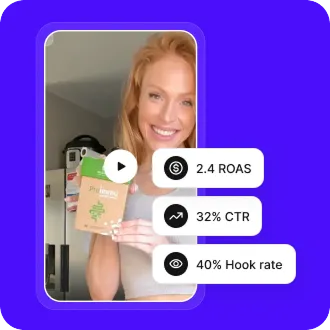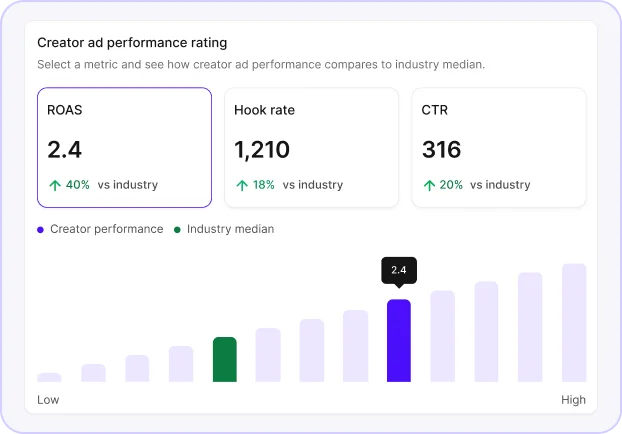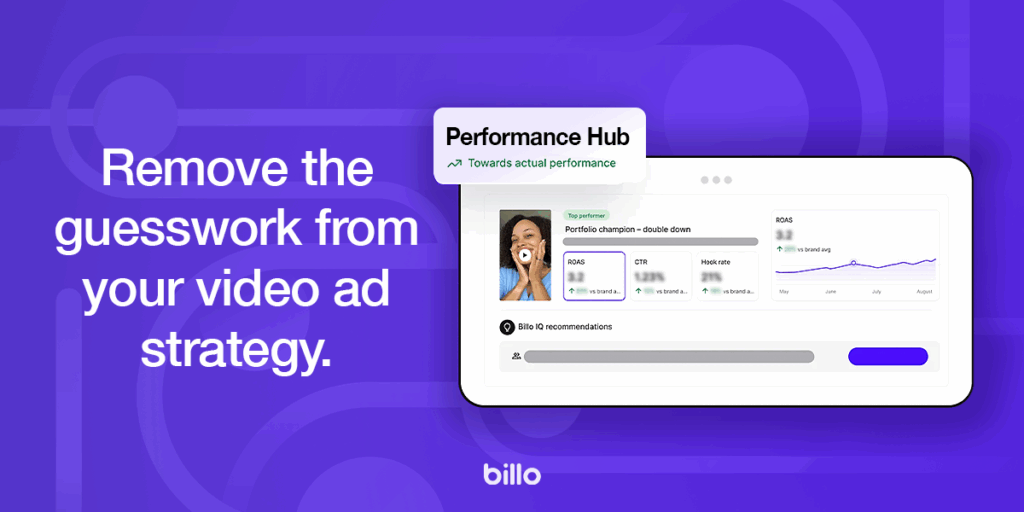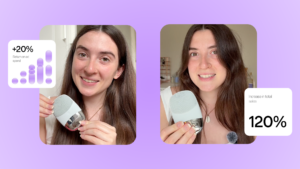Video Advertising Insights: Make Your Campaign Shine
Passionate content and search marketer aiming to bring great products front and center. When not hunched over my keyboard, you will find me in a city running a race, cycling or simply enjoying my life with a book in hand.

Social media video ads are where attention, engagement, and growth intersect in 2025. The platforms fueling this boom demand video advertising insights – data-driven signals that help marketers know what works, why it works, and how to scale it.
Let’s explore the newest benchmarks and research shaping the social video ad space At the same time looking at how you can turn that into a smarter strategy.
TL;DR
- Digital video ad spend in the U.S. will hit $72.4B in 2025, making up 58% of all TV/video budgets, as social video overtakes traditional TV for attention and ad dollars.
- Global social media reach now tops 5.4B users (65.7% of the world’s population), but platform volatility (e.g., a potential TikTok ban) threatens billions in ad spend.
- Social commerce is growing – 17.1% of e-commerce sales now flow through social, but ROI remains uneven, with only 39% of social-first brands reporting strong returns.
- Ad fraud surged to $37.7B in 2024, with a 101% increase in bot-driven fraud, making fraud detection and brand-suitability filters critical.
- Marketers should prioritize short-form, creator-led, and shoppable video. They should also tie spend directly to metrics like ROI, engagement, and conversions to avoid wasted budget.
The Macro Picture: Social Video Is Eating TV
Digital video ad spending is accelerating fast. In the U.S. alone, digital video ad spend is projected to hit $72.4 billion in 2025. That is up 14% year-over-year. At the same time, 58% of all TV and video ad budgets now go to digital video, marking a tipping point where social-led video is taking priority over traditional TV buys.
Why does this matter? Because social platforms are no longer just discovery engines – they’re replacing television as the primary way people consume video content. Short-form formats like TikTok, YouTube Shorts, and Instagram Reels are pulling younger audiences away from broadcast TV, while advertisers follow the attention. Marketers that once reserved big-budget campaigns for prime-time TV are now shifting dollars into mobile-first, creator-driven content that’s cheaper to produce and easier to measure.
This shift also speaks to efficiency: while TV delivers reach, social video delivers reach with performance data, giving brands the ability to optimize on the fly, test creative variations, and prove ROI in real-time.
For advertisers, these numbers aren’t just about spend, they represent a fundamental reshaping of how brand stories get told and measured in 2025.
Social Reach & Platform Risks
As of mid‑2025, the number of social media user identities globally has grown to 5.41 billion, representing 65.7 percent of the world’s population. That means your ads aren’t just reaching people, they’re potentially seen by nearly two-thirds of humanity. In highly urbanized markets, usage often exceeds 90%, making social platforms the dominant gateway for digital attention.
Why this matters for advertisers:
- Unprecedented reach: No other medium can match daily exposure across demographics, regions, and mindsets.
- Global optimization: Every dollar spent on social potentially engages billions. But performance still hinges on cultural and contextual relevance.
- Mobile-first dominance: With most social users online via smartphones, mobile-optimized video formats and vertical-first creative are non-negotiable.
But reach comes with risk – chiefly from platform volatility. TikTok, which has emerged as a key driver of social video ad growth, faced a potential U.S. ban in 2025. That scenario puts about $11 billion in annual U.S. ad spend at risk being redistributed to competitors like Instagram Reels and YouTube Shorts.
Why this pressure matters:
- Platform fragility: Even highly engaging platforms can vanish or lose access overnight due to regulatory, political, or privacy factors.
- Ad spend inflation: As TikTok budgets shift, other social platforms may experience surging CPMs, stretching media budgets unpredictably.
- Creativity at risk: TikTok’s unique algorithmic mechanics, like “For You” feeds and creator momentum, aren’t easy to replicate elsewhere. This makes budget realignment a performance gamble.
Key Actions for Smart Advertisers
- Prepare elastic creative. Ensure your video formats, messages, and messaging adapt quickly to new environments – organic and paid alike.
- Diversify your social mix. Avoid over-reliance on any single platform. Build presence on Instagram, YouTube Shorts, Snapchat, and emerging channels.
- Track regulatory signals. Local or global news shifts could impact platform viability. Stay ahead by assigning budget flexibility and response playbooks.
- Map ad performance across platforms. Compare cost, reach, and engagement trends in real time. Pivot faster when volatility spikes.

Explore the Latest TikTok Ad Trends
What These Insights Mean for Your Social Media Ads
Social platforms dominate video engagement, but only the marketers who couple insights with strategy win.
1. Invest in Social Video, But Track Performance
Why it matters:
Social video is no longer optional. In 2025, 91% of marketers prioritize video as central to their strategy, and 89–93% report strong ROI on video investments.
Take action:
- Measure against key performance metrics: view-through rates, CTR, and conversions – not just impressions.
- Focus on short-form, scroll-stopping ads (15-60 seconds) that hook quickly.

2. Nail Social Commerce – But Track the Loop
Why it matters:
Social commerce is gaining traction—17.1% of all online sales occur via social platforms in 2025, and mature brands now derive 14.4% of total revenue directly through social shopping.
Yet only 39% of social-first B2C brands say their social commerce generates high ROI.
Take action:
- Monitor performance rigorously and adjust creative or checkout experiences when ROI stalls. Tools like Billo’s performance hub can help monitor creatives and suggest what changes can increase results.

- Build and optimize the full consumer path – from video discovery to in-app purchase tracking.
3. Monitor Platform Risk & Diversify Channels
Why it matters:
With TikTok’s U.S. fate uncertain, risk is real. That $11 billion in ad spend could shift, driving up costs on competitors like Reels and Shorts. At the same time, over 50% of brands plan to increase creator/influencer budget in 2025, signaling a shift toward longer-term storytelling and diversified content strategies.
Take action:
- Prepare a pivot playbook so you can switch platforms smoothly if one becomes too risky or expensive.
- Spread your ad budget across multiple platforms, not just one social channel.
- Build a mix of creator-led content and in-house assets that can be moved between platforms.
Video Advertising Insights – Solutions Cheat Sheet
| Insight / Scenario | Action Item |
|---|---|
| Video ROI is high | Invest in short-form video tied to performance metrics like VTR & conversions |
| Social commerce has upside but mixed ROI | Optimize in-app purchase flows, track end-to-end, refine creative if weak |
| Platform volatility (e.g., TikTok ban risk) | Diversify spend across Reels, Shorts, Snap, Meta; keep a pivot plan ready |
| Rising ad fraud and bot traffic | Deploy fraud detection tools; focus on verified impressions and viewability |
| Global social reach (5.4B+ users) | Localize creative for cultural fit; adapt formats region by region |
| High CPMs on premium platforms | Balance with UGC-driven ads; test emerging, lower-cost platforms |
| Creator content outperforms polished ads | Partner with UGC creators; test multiple hooks and authentic storylines |
| Short attention spans (6s recall rule) | Front-load hooks and CTAs in first 3-5 seconds of video |
| Increased focus on brand safety | Use blocklists, contextual targeting, and brand suitability controls |
| AI-driven ad personalization | Test AI-powered creative variations, but review for tone/brand consistency |
| Shift toward vertical-first consumption | Design all ads vertical-first (9:16), with subtitles and sound-off readiness |
| Audience fatigue with repetitive ads | Rotate creatives every 2–3 weeks; scale winners but introduce variations |
Summary: Turn Video Advertising Insights Into Your Advantage
Social media video is no longer just another channel, it’s now the backbone of digital advertising. In 2025, the difference between wasted spend and breakthrough growth comes down to one thing: how well you use video advertising insights.
The brands that win aren’t simply the biggest spenders – they’re the fastest learners. They track ROI across the full funnel, protect budgets with fraud prevention and brand-suitability filters, and adapt quickly when platforms shift. Most importantly, they invest in short-form, creator-led, and shoppable formats that compound returns across the customer journey.
Don’t just buy more impressions. Buy better performance. With Billo Performance hub, turn video advertising insights into your creative operating system, and make every social video dollar compound into measurable growth.
The future of video is social. If you’re learning faster, testing smarter, and adapting quicker, you’ll lead the pack.
FAQs
What are video advertising insights?
They are data-driven signals – like engagement rates, view-throughs, fraud detection, and ROI benchmarks. They help marketers optimize social media video campaigns.
Why are video advertising insights important in 2025?
Because digital video ad spend is surging to $72.4B in the U.S., now representing 58% of TV/video budgets. Without insights, brands risk overspending on reach without proven impact.
How can I reduce wasted ad spend on social video?
Use deduplicated reach and MMM tools to spot overlaps, and prioritize metrics like view-through and conversions over impressions. Fraud detection and brand-suitability filters are also critical, as ad fraud hit $37.7B in 2024.
Which platforms should I focus on in 2025?
TikTok, Instagram Reels, and YouTube Shorts are leading short-form engagement. But with TikTok’s U.S. ad future uncertain ($11B at risk), brands should diversify budgets to reduce volatility.
Does social commerce really work?
Yes, but results are mixed. 17.1% of all e-commerce sales now flow through social, but only 39% of social-first brands report high ROI. The gap means marketers must track the full loop – from discovery to checkout and optimize creative accordingly.
What type of content performs best?
Research shows creator-led and UGC-style videos outperform polished ads in CTR and conversions. Short-form formats under 60 seconds, with strong hooks in the first 3-5 seconds, are most effective.
SEO Lead
Passionate content and search marketer aiming to bring great products front and center. When not hunched over my keyboard, you will find me in a city running a race, cycling or simply enjoying my life with a book in hand.

Authentic creator videos, powered by real performance data
22,000+ brands use Billo to turn UGC into high-ROAS video ads.
Why Repurposing Winning Ad Concepts Beats Consta...
Repurposing winning ad concepts changes how performance teams scale creative. [...]...
Read full articleFrom Guesswork to Growth: A Practical Creative T...
Ad-hoc creative testing often produces noisy results. When multiple variables [...]...
Read full articleTesting Ad Variations: How to Consistently Lift ...
Most performance gains come from better creative, not targeting tweaks. [...]...
Read full article




